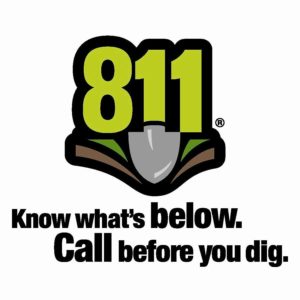 Region – Aug. 11 (8-11), is National 811 Safe Digging Day, and National Grid is reminding customers that every digging project, no matter how large or small, always requires a call to 811 (by dialing 811). National Grid’s new “Be the 1 to call 811/911” video shows the importance of calling 811 before starting any digging, and 911 if you smell gas.
Region – Aug. 11 (8-11), is National 811 Safe Digging Day, and National Grid is reminding customers that every digging project, no matter how large or small, always requires a call to 811 (by dialing 811). National Grid’s new “Be the 1 to call 811/911” video shows the importance of calling 811 before starting any digging, and 911 if you smell gas.
According to a press release from the company, nationally every nine minutes, an underground utility line is damaged because someone didn’t contact 811 before digging. Striking a single underground utility line can cause injury, repair costs, fines, and inconvenient outages. Every digging project, no matter how large or small, warrants contacting 811. Knowing where underground utility lines are buried before you dig will help protect you and your family from injury.
“Even when digging only a few inches, the risk of striking an underground utility line still exists. So, it’s critically important to call 811 before you dig to get all utilities marked,” said Mark Prewitt, National Grid vice president, compliance and assurance. “This is a big responsibility that we all need to take a small part in. By spreading the word to call 811 we can decrease damages, service interruptions, and injury—or even save a life.”
The depth of utility lines varies, and there may be multiple utility lines in one common area. A quick phone call to 811 at least two days before digging connects callers to an operator at a local One Call Center who will provide information on when participating utilities must clearly mark their underground equipment. The call is simple and the service is free of charge.
Whether you’re planting a tree or shrub, or installing a deck or pool, every job requires a call to 811 to know what’s below before digging. State laws mandate that 811 be called several days in advance of beginning projects that require excavation. Failure to call 811 may be punishable by fines, but even more important, calling 811 is the right thing to do because it helps keep everyone safe by preventing potentially deadly contact with underground electricity and gas lines.
If You Suspect a Natural Gas Leak, Call 911 and National Grid:
Customers are the first line of defense when it comes to gas leak detection and helping to keep homes and the community safe. If you smell gas anywhere, including in your home, go outside and call 911 and National Grid’s emergency number immediately at 1-800-235-5325.
Do not assume that someone else has already reported the emergency.
National Grid considers any of the below a gas emergency:
- You smell gas or suspect a gas leak.
- There is an abnormally high or low flame or no gas in all your gas appliances.
- Gas to an appliance or heating unit cannot be shut off.
- There is a continuous flow of water leaking from your gas heating unit or water heater.
- Gas pipes are making unusual noises like roaring, hissing or whistling.
- You notice dead vegetation that does not have a cause to be there.
- You see a white cloud, mist, fog or bubbles in standing water.
- There is an odor other than natural gas that is irritating to your eyes, nose and/or throat or someone is exhibiting symptoms of carbon monoxide exposure such as headache, nausea, lethargy, disorientation and combativeness.
As every report of a gas leak is a potentially hazardous situation, it is recommended that you evacuate the premises along with any family members and pets and wait for the technician to arrive.
Keep this in mind if you suspect a leak:
- Leave the premise immediately.
- Leave windows and doors as they are.
- Do not touch any electrical or light switches, doorbells, phones or anything that could cause a spark such as any appliances or thermostats.
- Do not turn any electrical equipment on or off.
- Do not pull plugs from outlets.
- Extinguish any open flames such as lit candles.
- If you have a gas range or oven make sure the controls are turned off.
- Do not smoke or light matches.
National Grid invites everyone to become an e-SMART worker. Check out training tips, videos and case studies. Each is designed to help you and your team work safely around electric and/or natural gas lines. Learn more at https://ngridsafety.com/.














